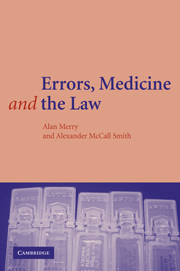4 - Violations
Published online by Cambridge University Press: 05 October 2013
Summary
It is not only error that contributes to the failure of human endeavour. People drink, drive and wreak havoc on the road. Substandard structures are erected, and collapse, with loss of lives. Doctors in intensive care units fail to wash their hands between patients, and contribute to the problem of cross-infection. There are many situations like these in which harm flows from an action which, in contrast to an error, is quite deliberate in its conceptualisation and execution, even though no harm was intended. We have said that errors are entirely involuntary. The moral implications of an injury are quite different if some element of choice by the actor was involved in the actions which led to its causation. A mistake (mistakes being that subset of errors in which the flaw lies in the decision or plan) is defined as an error precisely because the actor believes that the action is an appropriate way of achieving an objective safely. He or she is acting in good faith, trying to do the best possible thing, but failing. A decision or plan can no longer be considered a mistake (or any other kind of error under the definition in chapter 3) if the person concerned knows that there is a more acceptable alternative, or an alternative more likely to achieve the given objective safely, and yet deliberately chooses the less satisfactory alternative.
- Type
- Chapter
- Information
- Errors, Medicine and the Law , pp. 98 - 126Publisher: Cambridge University PressPrint publication year: 2001



